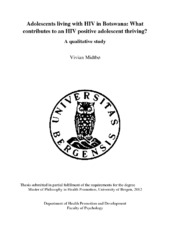| dc.description.abstract | Background: HIV positive adolescents' well-being is becoming an increasingly important issue, as antiretroviral medications are contributing to more HIV positive children surviving into adolescence and adulthood. Sub-Saharan Africa has the world's highest HIV incidence, with about two thirds of the 34 million people infected worldwide, living in this region. Botswana has the second highest infection rate in the world, and the epidemic has left a large proportion of children and adolescents orphaned. Many of the adolescents living with HIV in Botswana today have been HIV positive since they were born, or contracted HIV as infants via breastfeeding. A large number of these have for a great part of their lives been unaware of their diagnosis, as their caregivers have kept it a secret. Previous studies have looked at different aspects of disclosure of HIV status to children and adolescents, HIV-stigma and the mental health of HIV positive children and adolescents. However, few studies have explored these issues from the adolescents' point of view, and the majority of the studies are conducted in developed countries. Furthermore, a lot of the existing literature has explored the negative aspects of living with HIV; few have evaluated HIV positive adolescents who are thriving. Objectives: Two objectives were addressed: Objective 1) what makes HIV positive adolescents thrive, in spite of a complex difficult life situation? The following research questions were identified and addressed: 1) what contributes to well-being in an HIV positive adolescent? -Are there any positive factors in his/her environment? 2) What is important for the adolescents in the disclosure process? 3) Are there any differences in coping before and after being disclosed to? 4) How do the adolescents deal with the stigma related to HIV? Objective 2) is there evidence in the participants' narratives that Sense of Coherence plays a role in positive coping? Theoretical framework: For this study a salutogenic approach was implemented, which views health in relation to what creates health rather than what causes disease. Salutogenesis encompasses two main components: Generalised Resistance Resources (GRR) and Sense of Coherense (SOC). By exploring what was positive and strengthening in an HIV positive adolescent's life, it was possible to identify pathways to what creates health and well-being among this group of adolescents. Methods: A phenomenological approach was implemented, facilitating the understanding of the lived experiences to seek a deeper explanation of a phenomenon. Data were collected in an urban and a rural area of Botswana, through focus group discussions, individual interviews and observations during a three month period from June to September 2011. 16 adolescents and three key personnel were enrolled in the study. Translators were used in all the interviews except one, to translate between English and the local language, Setswana. All the interviews were recorded and transcribed, and the Setswana recordings were translated into English. The data were analysed using directed content analysis, categorising ideas from the data into themes, based on the research questions. Permission to do the study was obtained from the required instances in Botswana and Norway, and informed consent was obtained from all the participants, and from caregivers of participants under the age of 18 years. Results... | en_US |
